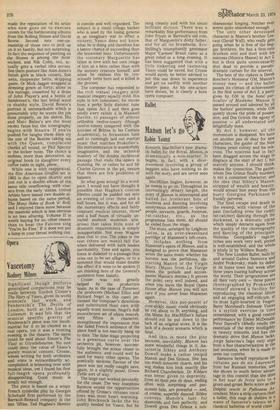Opera
Vascetomy
Rodney Milnes
Significant though perforce generalised comparisons may be made between Gordon Crosse's The Story of Vasco, given its world premiere last week, and Penderecki's The Devils of Loudon, both at the London Coliseum. It was felt that the musical specific gravity of Penderecki's piece was too insubstantial for it to be classed as a real opera, yet it was a riveting evening in the theatre. The same could be said about Einem's The Visit at Glyndebourne. No one could deny the value of Vasco's purely musical content. Crosse, whose writing for both orchestra and voice is extraordinarily accomplished, is brimming over with musical ideas, yet I found his first full-length opera profoundly disappointing. Good music is simply not enough.
The piece is based on a wispy French symbolist play by Georges Schehade first performed by the Barrault-Renaud company in the late 'fifties. Ted Hughes's libretto is concise and well organised. The subject is a timid village barber who is used by the losing general in an imaginary war to effect a victory; Vasco does not know what he is doing and therefore has a better chance of succeeding than the brawniest hero. Unfortunately the visionary Marguerite has fallen in love with her own image of him as a hero rather than with the mousey creature himself, and when he realises this he consciously turns hero and is killed in the process.
The composer has responded to the rich textual imagery with musical imagery equally vivid. His style is not consistent; he moves from a perky little diatonic tune that opens Act 2 and then goes wildly awry rather a la Maxwell Davies, to passages of almost orthodox twelve-tonery (though twelve-tonery tempered with the lyricism of Britten in his Cantata Academica), to Straussian lush and to cunningly laid out martial music that matches Prokofiev's.
His instrumentation is wonderfully imaginative, and the technical mastery of the double orchestral passage that ends the opera is stunning. He, or rather he and Sir Charles Groves in the pit, ensure that there are few problems of balance.
So what goes wrong? In a word: pace. I would not have thought it
possible that Hughes's concise libretto could be padded out into an evening of over three and a half hours, but it was, and for all the momentary effects and fairly constant musical interest, three'
and a half hours of virtually unvaried andante moderato aria
arioso that takes little note of dramatic requirements is simply insupportable. Not even Wagner does that to you. The jokes in the text (there are many) fall flat when delivered with such leaden inevitability. Time and again, you
listen in disbelief to a passage that cries out to be set allegro, or to a
sentence that would make double the effect if it were to be spoken (I am thinking here of the General's quotation from Isaiah).
Crosse was not greatly helped by the production
team. As in the case of Taverner,
the producers (Michael Elliot and Richard Negri in this case) jet tisoned the composer's directions and substituted their own with equally scant success. Negri's dull
monochrome set of objets trouves,
very 'fifties in character, strengthened the impression that the faded French ambience of the piece itself is not exactly bang up to date. The false stage projecting in a generous curve over the orchestra pit, however, successfully brought the action closer to the audience, and could well be used for many other operas. The poetically sardonic flavour of the
piece was not really caught save, again, in a slightly passé, Green Table sort of way.
The large cast worked devotedly for the cause. The way Josephine Barstow seized the opportunities offered by Crosse's virtuoso vocal lines was most heart warming. John Brecknock lacks the fey quality needed for Vasco, but he
sang cleanly and with his usual brilliant diction. There was a remarkably fine performance from John Fryatt in Barrault's old role, that of Marguerite's dotty father, and for all its broadness, Eric Shilling's triumphantly grotesque Major 'Carmen' Braun came as a great relief in a long evening. It has been suggested that with a little tinkering and tautening Vasco could be saved, but Crosse would surely be better advised to put this one down to experience and get on swiftly with another theatre piece. As his one-acters have shown, he is clearly a born opera composer.


































 Previous page
Previous page